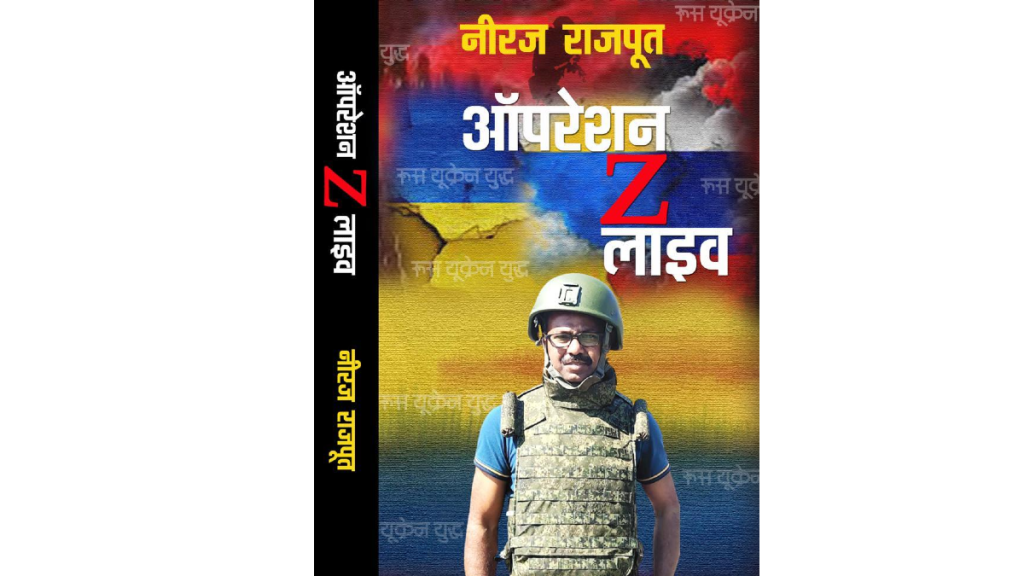Ranjit Kumar
Neeraj Rajput was among three Indian journalists who reported the Russia Ukraine war from the Russian side. This was not possible without getting embedded with Russian forces. Without proper accreditation from the Russian defence and foreign ministries it could not have been possible for any war correspondent to venture inside a war zone. But crossing over to the Russian controlled Donbass region, comprising two so called independent Republics of Donetsk and Luhansk was also full of struggle as suspecting Russian security men would cross check the identities several times. Sometimes they were very friendly, professional and sometimes rude also.
The author has written a brilliant account of his struggle to get inside the Russian controlled Donbass region, the Russian invasion and the Ukrainian resistance in his book in Hindi, titled Operation Z Live: Roos-Ukraine Yuddha, published by Prabhat Prakashan. Such war accounts are normally seen in English but Neeraj should be credited for his book in Hindi which is the only one.
Indians normally do not take much interest in a conflict happening 5,000 kms away. But in today’s interconnected, interdependent and globalised world, any citizen of the world cannot remain unaffected. Hence every Indian should be aware of the reasons and background of the conflict happening anywhere on the earth to better understand and appreciate the reasons affecting their common lives. This book does justice to that. It would have been better, if the writer had also dwelt in detail the geo-political reasons of the war, which is described in a passing way.
Though several Indian English news channels dispatched their correspondents, Neeraj was the only representative of a Hindi channel reporting directly from the war zone for over a month. He was able to reach the ordinary masses through his live reporting and could explain in simple language, the developments and the nuances of the war strategies.
The biggest dilemma for the embedded war correspondent is filing unbiased stories, but Neeraj Rajput can maintain his neutrality and present a real and true picture of the war scene. His factual reporting on alleged Russian chemical attack on Mariupol city of Ukraine, but under Russia control, earned him taunts in social media. His tweets depicting the falsehood of chemical attack in Mariupol went viral, and was even tagged by the Indian embassy in Moscow and the Russian defence ministry. This led to false allegations against him as a part of the Russia propaganda team. This was the highlight of his reporting.
The biggest dilemma for Neeraj was how to describe the war. As Russia dictated “special military operation”, whereas the truth was that Russia had made a unilateral military invasion.
Neeraj writes that if he had ignored Russia guidelines he would not have been accepted as embedded correspondent, but taking advantage of Hindi language, in which he was reporting, he found a way to name the war which he actually describes the nature of the conflict or attack on Ukraine which was a real violation of the sovereignty of a UN member and to which Indian government has also indirectly and repeatedly referred to.
When Prime Minister Narendra Modi met Russian President Vladimir Putin he told him very frankly that “this is not an era of war”. When Neeraj went to Russia to cover in the early days he could not also fathom when the war would end. Unfortunately, more than 18 months has elapsed, the war is still on, which perhaps shifted more in the information warfare domain as correctly described by Neeraj in his book.
If you are covering a war between your own nation and a neighbouring country, and if you are embedded with your mother country, then you can take advantage of describing the war from a national angle and be a part of information warfare, but when you are covering a war between two distant nations, you would always be in dilemma how to use the information being fed to you and as an embedded war correspondent, you are expected to oblige.
The book, thus, is a good read for all present and future war correspondents. What are the do’s and don’ts, and how one should be equipped with relevant documents and if you don’t possess, how you should deal with the situation in the war zone.
Reviewer of the book is an independent senior journalist.
Disclaimer: Views expressed are personal and do not reflect the official position or policy of Financial Express Online. Reproducing this content without permission is prohibited.

